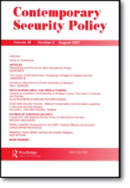The Idiosyncrasies of Contemporary Swiss Security Policy and Practice

A Strategic Culture-Based Explanation
Autor(en): Wilhelm Mirow
Journaltitel: Contemporary Security Policy
Reviewed:
Verlag(e): Routledge
Publikationsjahr: 2012
